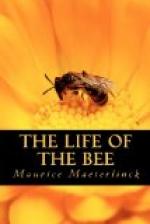“There is no truth for us yet,” a great physiologist of our day remarked to me once, as I walked with him in the country; “there is no truth yet, but there are everywhere three very good semblances of truth. Each man makes his own choice, or rather, perhaps, has it thrust upon him; and this choice, whether it be thrust upon him, or whether, as is often the case, he have made it without due reflection, this choice, to which he clings, will determine the form and the conduct of all that enters within him. The friend whom we meet, the woman who approaches and smiles, the love that unlocks our heart, the death or sorrow that seals it, the September sky above us, this superb and delightful garden, wherein we see, as in Corneille’s ‘Psyche,’ bowers of greenery resting on gilded statues, and the flocks grazing yonder, with their shepherd asleep, and the last houses of the village, and the sea between the trees,—all these are raised or degraded before they enter within us, are adorned or despoiled, in accordance with the little signal this choice of ours makes to them. We must learn to select from among these semblances of truth. I have spent my own life in eager search for the smaller truths, the physical causes; and now, at the end of my days, I begin to cherish, not what would lead me from these, but what would precede them, and, above all, what would somewhat surpass them.” We had attained the summit of a plateau in the “pays de Caux,” in Normandy, which is supple as an English park, but natural and limitless. It is one of the rare spots on the globe where nature reveals herself to us unfailingly wholesome and green. A little further to the north the country is threatened with barrenness, a little further to the south, it is fatigued and scorched by the sun. At the end of a plain that ran down to the edge of the sea, some peasants were erecting a stack of corn. “Look,” he said, “seen from here, they are beautiful. They are constructing that simple and yet so important thing, which is above all else the happy and almost unvarying monument of human life taking root—a stack of corn. The distance, the air of the evening, weave their joyous cries into a kind of song without words, which replies to the noble song of the leaves as they whisper over our heads. Above them the sky is magnificent; and one almost might fancy that beneficent spirits, waving palm-trees of fire, had swept all the light towards the stack, to give the workers more time. And the track of the palms still remains in the sky. See the humble church by their side, overlooking and watching them, in the midst of the rounded lime trees and the grass of the homely graveyard, that faces its native ocean. They are fitly erecting their monument of life underneath the monuments of their dead, who made the same gestures and still are with them. Take in the whole picture. There are no special, characteristic features, such as we find in England, Provence, or Holland. It is the presentment, large and ordinary enough to




